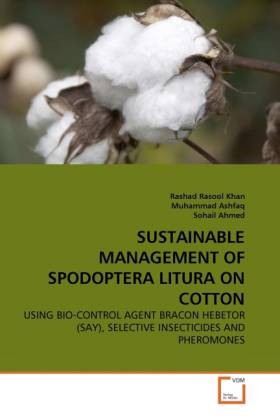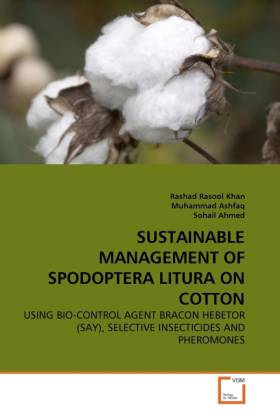
Je cadeautjes zeker op tijd in huis hebben voor de feestdagen? Kom langs in onze winkels en vind het perfecte geschenk!
- Afhalen na 1 uur in een winkel met voorraad
- Gratis thuislevering in België vanaf € 30
- Ruim aanbod met 7 miljoen producten
Je cadeautjes zeker op tijd in huis hebben voor de feestdagen? Kom langs in onze winkels en vind het perfecte geschenk!
- Afhalen na 1 uur in een winkel met voorraad
- Gratis thuislevering in België vanaf € 30
- Ruim aanbod met 7 miljoen producten
Zoeken
SUSTAINABLE MANAGEMENT OF SPODOPTERA LITURA ON COTTON
USING BIO-CONTROL AGENT BRACON HEBETOR (SAY), SELECTIVE INSECTICIDES AND PHEROMONES
Rashad Rasool Khan, Muhammad Ashfaq, Sohail Ahmed
Paperback | Engels
€ 93,45
+ 186 punten
Omschrijving
Cotton has been placed amongst one of the most important cash crops, in Pakistan. Armyworm, Spodoptera litura, is one of the most notorious chewing pests, attacking this crop and hence depriving the farmers from getting good yields. The project under study, was, therefore, planned to develop some control strategies which are not only effective in their implementation, but also safer to the non-target organisms. A bio-control agent, Bracon hebetor (Say.) was used to control the pest, along with integration of some new chemistry insecticides and pheromones throughout cotton growing season. The experiments were carried out under the laboratory conditions in the Dept. of Agri. Entomology, Univ. of Agriculture, Faisalabad, for the improvement of mass rearing of the parasitoid, its potential at various temperatures and searching ability. The experiments for the screening of insecticides for their selection in Pest Management program of were performed in the laboratory as well as semi-field and field conditions. Resultantly, the study recommends that bio-control agents should be integrated with other tactics in order to avoid the chemical load in the environment.
Specificaties
Betrokkenen
- Auteur(s):
- Uitgeverij:
Inhoud
- Aantal bladzijden:
- 176
- Taal:
- Engels
Eigenschappen
- Productcode (EAN):
- 9783639312102
- Verschijningsdatum:
- 3/02/2011
- Uitvoering:
- Paperback
- Afmetingen:
- 152 mm x 229 mm
- Gewicht:
- 268 g

Alleen bij Standaard Boekhandel
+ 186 punten op je klantenkaart van Standaard Boekhandel
Beoordelingen
We publiceren alleen reviews die voldoen aan de voorwaarden voor reviews. Bekijk onze voorwaarden voor reviews.









